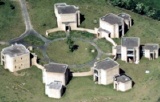Variational Methods for Stationary and Evolutionary Problems
12 May 2015
Organiser: Filip Rindler
To be held in the Zeeman Building, Room B3.03 (afternoon)
Speakers:
Jan Kristensen (Oxford)
Alexander Mielke (WIAS & HU Berlin)
Filip Rindler (Warwick)
Registration:
Registration is free - please click here to register your attendance.
Unfortunately, it will not be possible for any funding towards travel or accomodation to be provided.
Tentative schedule:
| 12:00 |
Lunch in Common Room* |
| 12:30pm |
Alexander Mielke |
|
2pm |
Break |
|
2.15pm |
Jan Kristensen |
| 3.45pm | Tea |
| 4.30pm | Filip Rindler |
| 5.30pm | Close |
* for registeres participants.
Titles & abstracts:
Alexander Mielke: Evolutionary $\Gamma$-convergence for gradient systems
explained via applications
Since gradient flows are defined in terms of two functionals, it is natural to ask the question whether the convergence of these functionals to limit functionals imply that the corresponding solutions converge to solutions of the limit system. We discuss sufficient conditions for such evolutionary
$\Gamma$-convergence results, namely (i) the Sandier-Serfaty approach based on the energy-dissipation principle and (ii) the evolutionary variational inequality. As didactical examples we treat homogenization of a parabolic equation and as an advance application we give a justification of amplitude equations.
Jan Kristensen: The Morse-Sard theorem, generalized Luzin property and level sets for Sobolev functions
Many classical results from multivariate calculus can be generalized to suitable Sobolev functions that need not even be everywhere differentiable. In this talk we discuss some new results that have been obtained in joint work with Jean Bourgain (Princeton) and Mikhail Korobkov (Novosibirsk).
Filip Rindler: Two-speed solutions to rate-independent systems
Despite their many applications (dry friction, elastoplasticity, damage models,...), the analysis of rate-independent systems still poses considerable challenges. These evolutionary process can in general only be expected to have BV-regularity, so one needs to understand their behavior on jumps. It turns out that direct ("affine") jumps often do not model the physical reality very well and so a fine analysis has to be performed. I will present a physically-motivated notion of solution that has two time scales, a slow and a fast one, the latter parametrizing the jumps. In this way one can prove existence to some rate-independent problems in a realistic framework.
Further information will be added is it becomes available.
Funding for this is event is provided by:



See also:
Mathematics Research Centre
Mathematical Interdisciplinary Research at Warwick (MIR@W)
Past Events
Past Symposia
Where possible, visitors should obtain an EDUROAM account from their own university to enable internet access whilst at Warwick.
You can register for any of the symposia or workshops online. To see which registrations are currently open and to submit a registration, please click hereLink opens in a new window.
Mathematics Research Centre
Zeeman Building
University of Warwick
Coventry CV4 7AL - UK
E-mail:
MRC@warwick.ac.uk

